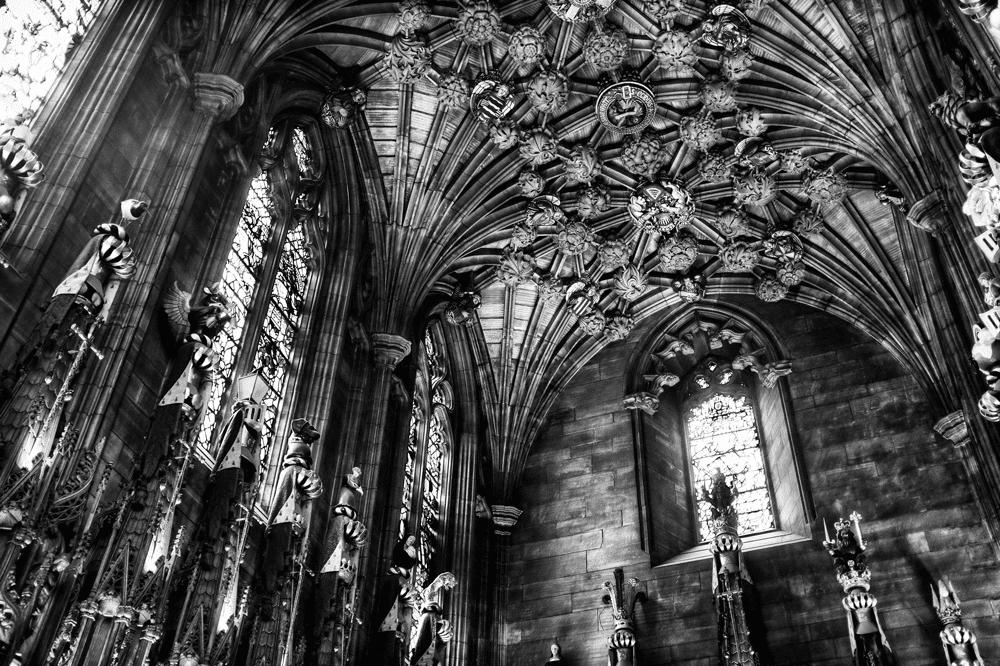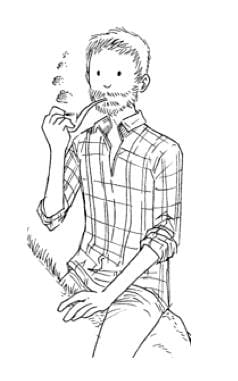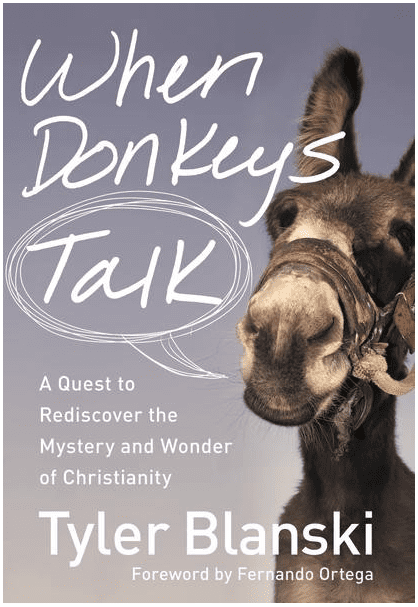A blog for Catholic men that seeks to encourage virtue, the pursuit of holiness and the art of true masculinity.
The Book That Made Me Catholic

If I were to tell you that I had a talking donkey, you would probably chuckle and pour another drink. If I were to insist that I was entirely serious, you would probably back away slowly and, with no masked alarm, look for the nearest exit. Nothing ruins a good party like a story about a miracle. “It was a trick of the nerves, an illusion,” those who dared to hang around would counsel, surveying me with concerned puppy eyes. “Have you taken your medication?” I do not have a donkey, but if I did, I would want it to be a talking donkey.
So begins the book that eventually made me become Catholic, a book in which Christianity is an old-growth forest, a world crowded with angels and saints and sacraments and wild theories about how the Incarnation has comprehensive implications for the universe and for us. We need a holy renaissance. But the path through Christendom is old and dangerous, and careful reconnoitering is necessary. This is, at least, the modest justification for the travelogue, When Donkeys Talk: A Quest to Rediscover the Mystery and Wonder of Christianity (Zondervan, 2013).
The strange thing is, it’s written by a Protestant; that is to say, I had not yet been received into the Church when I wrote it. I was somewhere in between, in a via media, and I was searching for home. Writing When Donkeys Talk was my way of going on a “holy pilgrimage” in search of something more.
So I plunged irreversibly into the old forests Christendom. Even though I was no Saint George when it comes to fighting dragons, I hoisted a backpack of library books, tightened my grip on my proverbial donkey’s reins, and stepped portentously onto the old trail at the edge of the darkening pines. It was to be my ruining. As John Henry Cardinal Newman once said, “To be deep in history is to cease to be Protestant.”
Holy Pilgrimage
“It’s a dangerous business, Frodo, going out your door,” it has been said. “There’s no knowing where you might be swept off to.” It’s a dangerous business, writing books, especially books that are holy pilgrimages through Christendom. There’s no knowing where your prayers and research will lead you.

The old forest of Church history is full of peril. Before I got down to any real research, I suffered foreboding stories (always shared with a knowing chuckle and a grin) of woebegone wayfarers who ventured to go on holy pilgrimages into Church history only to wake to find themselves sharing the same tent with a pagan for a few confused and colorful moments. I heard stories of poor pilgrims who suddenly vanished in a heretical haze. Others wandered into the cloaking mists of what has been called the luminous darkness of God, never to be the same again. Some even became Catholic. It took only a little light reading and almost no imagination for me to envision the same coming true for me—except for the Catholic part.
I had no idea that within a year I would be received into the Church. In fact, at the time I thought I was “more catholic” than the Catholics! I remember being more than a little flustered when Catholic blogger Haley Stewart said in a review of When Donkeys Talk: “But as a Catholic convert, I found myself asking, now that we have journeyed into the depths of historical Christianity, where do we go from here? Blanski gives us an itinerary for the beginning of our quest: holy time, holy sacraments. But there is so much more to be found.” To my consternation, she continued: “Blanski’s holy pilgrimage seems to end just shy of the truths to be found in Roman Catholicism. His work points toward these truths, serving as a useful beacon to those only just setting out, and to those who have arrived at the final destination and have begun to make a home.”
Church history is an old growth forest. From the outside it can look dark and ominous, but on the inside it is full of song and mirth. To enter it is to become, in a slow but infallible succession of discoveries, a Catholic. If I had known where the journey would end, I would have never started writing.
Humbled But Happy
As I saddled a donkey and clip-clopped through “the Olde World,” I began to think less highly of myself. The deeper I journeyed, the less infallible my interpretations of Scripture seemed. My hodgepodge collection of catholica and accumulated beliefs began to look more like a loose thread, and less like the original tapestry. In fact, by the time the book was published, my “custom catholicism” was already beginning to collapse. I was miserable—and strangely happy.
Happiness is impossible without humility, but today we are humble in the wrong way. “A man was meant to be doubtful of himself,” G.K. Chesterton said, “but undoubting about the truth; this has been exactly reversed.” Today we tend to believe in our own personal experience of what we think is true.
One of the ways this plays out is in an individualistic, consumerist attitude that shapes our outlook toward all of life, even religion. We prefer our own private interpretations of Scripture to the living voice of God in his infallible Church. Even when it comes to religious truth, we like to shop—as if Christian truth can be tailored to individual customers!
But it’s no small thing that we live in a world, not a chaos. The universe is not disorderly, but patterned and meaningful. It is intelligible. This is why we dare to cross bridges and go ice fishing. So also, the Catholic Church reminds us that Christianity is not a disordered mash-up of beliefs and cool traditions you can sample to suit your own personal opinion. It is, in the richest sense of the word, a world. The means of grace are intelligible. This is why Catholics dare to approach the altar of God, to evangelize, even to die for the faith. The love of God is more real than the law of gravity. The teaching of the Church is sure. The Anglican convert to Catholicism, Msgr Robert Hugh Benson, puts it this way:
It is only a dead religion to which written records are sufficient…the Teaching Church must know her own mind with regard to the treasure committed to her care, and supremely on those points on which the salvation of her children depends. She may be undecided and permit divergent views on purely speculative points…but in things that directly and practically affect souls—with regard to the fact of grace, its channels, the things necessary for salvation, and the rest—she must not only know her mind, but must be constantly declaring it, and no less constantly silencing those who would obscure or misinterpret it.
Writing When Donkeys Talk was humiliating. Soon after it was published, my tailor-made Christianity was ripped to shreds. Within months, I found myself standing in the shadow of the Gospel and the Gothic, humbled but happy.
The Holy Mass is like a Medieval Bludgeon
If you could spread out a map of all there is to reconnoiter of Christendom, you would find that the book covers only one tiny freckle on a vast and daunting landscape. The first half does battle against disenchantment and tries to recover a glimpse of the coherency of creation in Christ. But near the end of the journey, readers take a sharp right turn into the “Middle Earth” of the Church: covenant, koinonia, and the Lord’s Supper. After about four score and seven “trinitarian breakfasts” and nearly two hundred whiffs of Tolkien’s pipe smoke, my journey led me straight to the center of enchanted Christianity—the Holy Sacrifice of the Mass.
The Eucharist is a medieval bludgeon to all our presuppositions, all our pet theories. As Ratzinger put it, “we do not want God as near as that; we do not want him so small, humbling himself; we want him to be great and far away.” But, in the words G.K. Chesterton, “How much happier you would be, how much more of you there would be, if the hammer of a higher God could smash your small cosmos.”
Speaking of the Holy Mass, Saint Augustine said, “You are what you eat.” The blood of Christ courses through our veins. As the Body and Bride of Jesus Christ, our job is to keep the neighborhood weird and wonderful, to be salt in a spoiling world. There is hope in the horror. We are participants in God’s unfolding story of creation and redemption. We get to make preparations for a holy renaissance.
While writing, I thought I was battling the disenchantment of the Enlightenment, but I was in fact contending those giants, the passion and pride of my own soul. I was laying my will down on the anvil. The Eucharist was the hammer.
The Kingdom of God is Seriously Nigh
 Perhaps the greatest weakness of this travelogue is a modest strength. When Donkeys Talk does not proclaim the truth, but rather longs for it. The author wanders through jolly, squalid old Europe longing to live in a God-bathed world—without the private reservations and personal conditions demanded as part of an agreement. Nothing but the wonder of the sacraments and the last enchantments and the love that moves the stars.
Perhaps the greatest weakness of this travelogue is a modest strength. When Donkeys Talk does not proclaim the truth, but rather longs for it. The author wanders through jolly, squalid old Europe longing to live in a God-bathed world—without the private reservations and personal conditions demanded as part of an agreement. Nothing but the wonder of the sacraments and the last enchantments and the love that moves the stars.
Do you know someone who is disenchanted or skeptical? Do you have a non-Catholic friend who would never read a book written by a Catholic? Despite its many faults, there is one book you might want to give them. Although, between you and me, the slim paperback barely scratches the surface of the deep magic. If Catholicism were the land of Narnia, I feel like I only just opened the wardrobe.
In When Donkeys Talk I put it this way: “As far as I can tell—and I am, after all, only on a donkey—the Kingdom of God is extremely nigh. Holy water is everywhere. We need only to bless it. We live as creatures in creation, as participants in a blood-covenanted world. There is nary a hair on your head that will go unaccounted, not a corner of this world that will escape Baptism. The Kingdom of God is seriously nigh. We are on the brink. No, we are already swimming.”
—
Tyler Blanski is praying for a holy renaissance. He is the author of When Donkeys Talk: Rediscovering the Mystery and Wonder of Christianity (Zondervan, 2012) and Mud & Poetry: Love, Sex, and the Sacred (Upper Room Books, 2010). www.TylerBlanski.com.
I can’t help but feeling Rick Rolled by this post. I expected a book recommendation, instead I got a book (self-) promotion. Sorry, but I won’t be reading Mr. Blanski’s book.
Intriguing to a lifetime Catholic who feels like keeping faith is liken to chasing leaves on a windy day
I have to agree with Daniel here. I thought this was a book review by Sam G. or someone else. Not the author.
@Daniel Maybe you should rearrange yr expectations. Its not every day somebody “writes” his way into the church, and anyway isn’t this blog really about how cool catholicism is?
@Jimmy, I’m not questioning the content of the book, but the method of presentation on the blog. Having an author promote their own book like this strikes me as bad taste. Sam G. could have written about it, or interviewed Tyler B., and it would have been different, but they didn’t. It’s cool that somebody could ‘write’ their way into Catholicism – I’ve known a priest who had a literary conversion – but the point I was expressing was that what I got in the article was not what I expected – and not in a good way. This is no criticism, in general, of Catholic Gent – a blog which I enjoy – but an expression of my dissatisfaction with this single post. OK, that’s probably too many words explaining myself, but there it is. I’m glad you enjoyed the post, but I’m not going to pretend that I did.
Thank you thank you Tyler!!!! It must’ve taken a whole lotta courage to share your journey like that & to bare your heart for all to see, so personal & so vulnerable, & i’m just so inspired that you were open to the truths of the Faith. For what it’s worth @Daniel @Gary, maybe they’re missing the point a little bit. This article isn’t a ‘book promotion’ but a confession ,like an honest grappling with the strange way all of us experience mercy & this is the year of mercy people! I just feel like maybe Tyler isn’t asking any of us to buy his book but instead that he wants us to consider buying Catholicism & to go on a heart journey for ourselves you know? Thank you Tyler!!!
@Claudia Thank you for taking the words straight out of my head! I completely agree with your take. Great article and seems like an intriguing book.
Catholicism and life does have the ‘magic’ of Tolkien and other ‘grand’ stories, because it’s really God’s story after all, and HIS imagination.
The Holy Renaissance is indeed upon us my friends. In modern society it can become disheartening to argue for your beliefs seeing as society is so secular, but I wold encourage every Catholic to make every effort to stand for the Church and what is right and just whenever possible.
You’ll never ‘know everything’ about the Church and be able to ‘duke it out’ with everyone ‘in the moment’. The church is so vast and deep and profound that refuting any argument can prove challenging. But if you know a few simple truths you can enlighten others along the way, that much will suffice. Or hand them a copy of When Donkeys Talk. Let the Holy Spirit speak for you, it knows what to say.
Great website and article
Godbless
Who better to give you a flavor of his book than the author? I can understand the promotion vibe of it might put you off … but even authors gotta eat!